The Shona People: Mythical Beliefs in Zimbabwe

Looking for more amazing products? Check out our online store and explore our collection here! Happy shopping!
Before diving in, please note: This post is for informational purposes only. If you’d like to know more about how we approach topics, feel free to check out our friendly Disclaimer Page.
Hey there, amazing readers! 
We’re committed to delivering quality posts, and your support (even just sticking around despite the ads) means everything to us. So, bear with us, and thanks for helping us keep the good vibes rolling. Now, on to the fun stuff!
TRANSLATE BUTTON AT THE END OF THE ARTICLE
The Shona People: Mythical Beliefs in Zimbabwe
Introduction to the Shona People
The Shona people are the largest ethnic group in Zimbabwe, making up approximately 80% of the country’s population.
They have a rich cultural heritage, including a strong belief in mythical and spiritual entities.
The Shona are known for their deep connection to nature, ancestral worship, and a complex cosmology that shapes their understanding of the world.
Ancestral Worship and Beliefs
Ancestral worship plays a central role in Shona mythology.
The Shona believe that their ancestors continue to exist in a spiritual realm and can influence the lives of their descendants.
Ancestors are revered and respected, and their guidance is sought in important decisions and rituals.
The belief in ancestral spirits is so strong that many Shona families have sacred spaces within their homes dedicated to honoring their ancestors.
The Role of Spirits in Shona Mythology
Spirits are considered an integral part of Shona mythology.
They are believed to inhabit natural features such as rivers, mountains, and trees, and are seen as intermediaries between humans and the divine.
Shona people often make offerings and perform rituals to appease and communicate with these spirits.
Spirits are thought to have the ability to bring blessings or misfortune, depending on how they are treated.
Sacred Places and Rituals in Shona Culture
Shona culture is intertwined with sacred places and rituals.
These places, known as "nhaka" or "dzimbahwe," are believed to have a strong spiritual presence.
They can be natural features like caves or specific sites designated by the community.
Rituals are performed at these sacred places to honor ancestors, communicate with spirits, and seek divine intervention.
These rituals often involve music, dance, and offerings of food and drink.
The Significance of Totems in Shona Beliefs
Totems are an essential aspect of Shona identity and belief system.
Each Shona individual belongs to a specific totem, which is usually an animal or a natural element.
Totems are believed to have a spiritual connection and influence over an individual’s life.
They play a role in naming, marriage, and other important life events.
Totems are also a way for Shona people to maintain a connection with their ancestral heritage.
Shona People’s Connection to Nature and Spirits
The Shona people have a profound connection to nature, viewing it as a sacred and interconnected web of life.
They believe that spirits inhabit natural elements such as trees, rivers, and animals.
This belief fosters a deep respect for the environment and a sense of stewardship.
Traditional Shona practices promote sustainability and harmony with nature, recognizing that the well-being of the land and its inhabitants is interconnected.
The Influence of Spirits on Daily Life
Spirits are believed to have a significant influence on daily life in Shona society.
Many Shona people consult spirit mediums, known as "ngozi," to seek guidance and protection.
These mediums act as channels between the spiritual and physical realms, communicating with ancestral spirits and other supernatural beings.
Spirit possession is also common in Shona culture, where individuals may be overtaken by a spirit during ceremonies or rituals.
The Power of Shamans in Shona Society
Shamans, known as "n’anga," hold a respected and influential role in Shona society.
They are traditional healers and spiritual leaders who possess knowledge of traditional medicines, rituals, and the spirit world.
Shamans are sought after for their ability to communicate with spirits, diagnose illnesses, and provide remedies.
They play a vital role in maintaining balance and harmony within the community.
Legends and Folklore in Shona Mythology
Shona mythology is rich with legends and folklore that have been passed down through generations.
These stories often feature mythical creatures, heroes, and moral lessons.
One well-known legend is that of the "Nyami Nyami," a river spirit believed to reside in the Zambezi River.
The Nyami Nyami is seen as a protector and symbol of unity.
Folklore also includes tales of shape-shifting spirits, mermaids, and trickster figures.
Shona Creation Stories and Deities
Shona creation stories provide an explanation for the origins of the world and humanity.
One popular creation story involves the Supreme Being, Mwari, who created the first humans and animals.
Mwari is considered the highest deity in Shona mythology, overseeing the spiritual realm and cosmic order.
Other deities and spirits are believed to exist, each with their specific roles and powers.
Contemporary Shona Beliefs and Practices
While many Shona people continue to practice traditional beliefs, there has been a blending of traditional and Christian beliefs in contemporary Shona society.
Christianity was introduced to the region during colonial times and has made significant inroads.
However, even among those who identify as Christians, elements of Shona mythology and ancestral worship often persist.
This syncretism reflects the complex and ever-evolving nature of Shona beliefs in modern Zimbabwe.
Conclusion
The Shona people’s mythical beliefs are an integral part of their cultural identity.
Ancestral worship, spirits, sacred places, and rituals shape the worldview and daily lives of the Shona people.
Their deep connection to nature and spirits fosters a sense of harmony and respect for the environment.
Shamans and spirit mediums play important roles in Shona society, providing guidance, healing, and spiritual insights.
Legends, folklore, and creation stories further enrich the vibrant mythology of the Shona people.
While contemporary Shona beliefs may have been influenced by Christianity, traditional practices and beliefs persist, showcasing the resilience and adaptability of the Shona culture.

The Enlightenment Journey is a remarkable collection of writings authored by a distinguished group of experts in the fields of spirituality, new age, and esoteric knowledge.
This anthology features a diverse assembly of well-experienced authors who bring their profound insights and credible perspectives to the forefront.
Each contributor possesses a wealth of knowledge and wisdom, making them authorities in their respective domains.
Together, they offer readers a transformative journey into the realms of spiritual growth, self-discovery, and esoteric enlightenment.
The Enlightenment Journey is a testament to the collective expertise of these luminaries, providing readers with a rich tapestry of ideas and information to illuminate their spiritual path.
Our Diverse Expertise
While our primary focus is on spirituality and esotericism, we are equally passionate about exploring a wide range of other topics and niches 

To ensure we provide the most accurate and valuable insights, we collaborate with trusted experts in their respective domains 
Our blog originally focused on spirituality and metaphysics, but we’ve since expanded to cover a wide range of niches. Don’t worry—we continue to publish a lot of articles on spirituality! Frequently visit our blog to explore our diverse content and stay tuned for more insightful reads.
Hey there, amazing reader! 
Check out our store here and take a peek at some of our featured products below! Thanks for being awesome!













